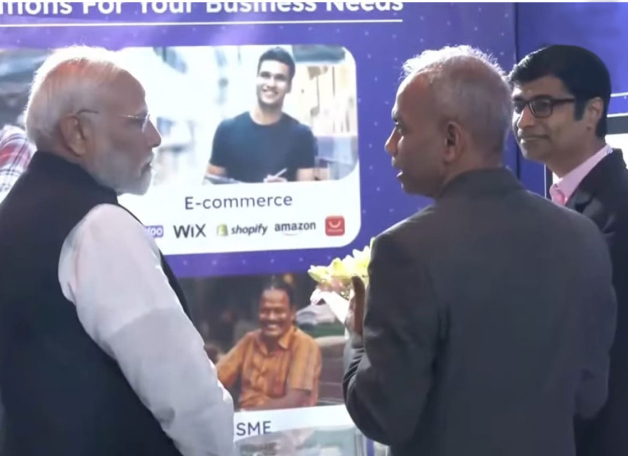Facilitating seamless cross-border payments for MSMEs is a pivotal factor in propelling them towards achieving 60% of the formidable $2 trillion export target by 2030
By Sanjay Tripathy
In the pursuit of Prime Minister Narendra Modi’s vision to transform India into a $5 trillion economy, one critical pillar stands tall: reaching $2 trillion in total exports by 2030. This isn’t just a significant economic milestone; it is a testament to India’s emergence as a significant player in the ever-evolving global trade landscape. But to reach this ambitious goal, we must acknowledge the role of an often overlooked yet pivotal factor – the seamless facilitation of cross-border payments, especially for Micro, Small, and Medium Enterprises (MSMEs).
Traditionally, international trade was a realm dominated by corporate giants, with the resources to navigate complex capital requirements, establish global connections, and comply with regulatory demands. However, the digital revolution has democratised global trade. Today, even small businesses can leverage B2B or B2C eCommerce platforms and online service providers to engage in international trade, thanks to technological advancements and enabling policies from the government and regulatory bodies. MSMEs can now harness their strategic location to integrate into global supply chains. By manufacturing components or providing services that fit seamlessly into these supply chains, they can access a broader customer base and secure stable, long-term partnerships. In FY 2022-23, MSME products accounted for 43.6% of India’s exports.
Cross-Border Payment Challenges for MSMEs
Traditionally, navigating cross-border low-value payments has felt like a financial maze, plagued by formidable challenges. Traditional methods for cross-border payments rely on correspondent banking relationships and SWIFT for secure communications. While international wire transfers are common, they are often slow and costly. Payment Service Providers (PSPs) offer alternatives with lower fees and quicker transfers, but several challenges persist as small and medium-sized enterprises (SMEs) bear the brunt of these obstacles, as they regularly make modest payments to vendors and customers. In emerging markets like India, these issues are aggravated by the use of intermediary currencies, adding layers of complexity to transactions. Some other challenges include:
- Hidden Charges: Behind weak exchange rates, hidden transfer and exchange charges quietly eat away your funds.
- Banking Woes: International bank transfers, a trustworthy method for many, come with a twist. Limited currency options in local banks often call for intermediary involvement, each adding to the financial burden. MSMEs need cost-effective solutions, not hurdles.
- Long Processing Time: Standard international payments move at a snail’s pace, taking 2 to 5 working days or even longer for remote destinations. Imagine real-time cross-border payments for business growth and competitiveness.
- Fraud Risks: In the digital age, fraud lurks as a constant threat. Cybercriminals aim to exploit cross-border transactions, putting businesses at risk. Robust security measures are imperative to safeguard every payment.
The Way Forward for MSMEs
Navigating the complex landscape of cross-border payments is no easy feat, but innovative technologies and forward-thinking minds are determined to unravel the challenges that lie ahead. While these hurdles may not disappear overnight, the groundwork is in place for swifter and more innovative solutions, with technology and APIs leading the transformation in this evolving landscape.
In this dynamic scenario, the recently introduced Foreign Trade Policy 2023 (FTP-23) serves as a guiding compass, outlining a comprehensive roadmap for India’s exports. FTP-23 sets its sights on propelling Indian exports to a remarkable $3 trillion by 2030, with eCommerce taking the lead and targeting $200-300 billion. Simultaneously, the government is actively streamlining business procedures, promoting digitisation, and implementing trade facilitation measures to cultivate a thriving export ecosystem for sustained growth.
The ultimate objective is to usher in a new era of transparency, efficiency, and visibility in cross-border payments. Imagine having a clear view into the status of your payments, the ability to direct the flow of funds, and substantial cost savings when sending and receiving payments across borders. These advantages empower businesses to expand globally, saving both time and money – a win-win situation.
To maintain a competitive edge, MSMEs must embrace cross-border payment platforms that facilitate instant payments, reduce costs, and enhance transparency, the key to mastering cross-border transactions. Payment platforms must have intuitive interfaces and easy-to-follow instructions, ensuring that MSMEs can navigate the process with confidence. Cross-border payment platforms must also adopt the most robust security measures to cultivate trust among the MSMEs apart from making it cheaper, faster and transparent. Empowered by the right payment platforms and knowledge, coupled with unwavering determination, MSMEs can surpass the challenging $2 trillion export target by 2030. As the backbone of economic growth, fostering their potential ensures a thriving future for all.
This appeared first in Livemint. Read the original piece here.








